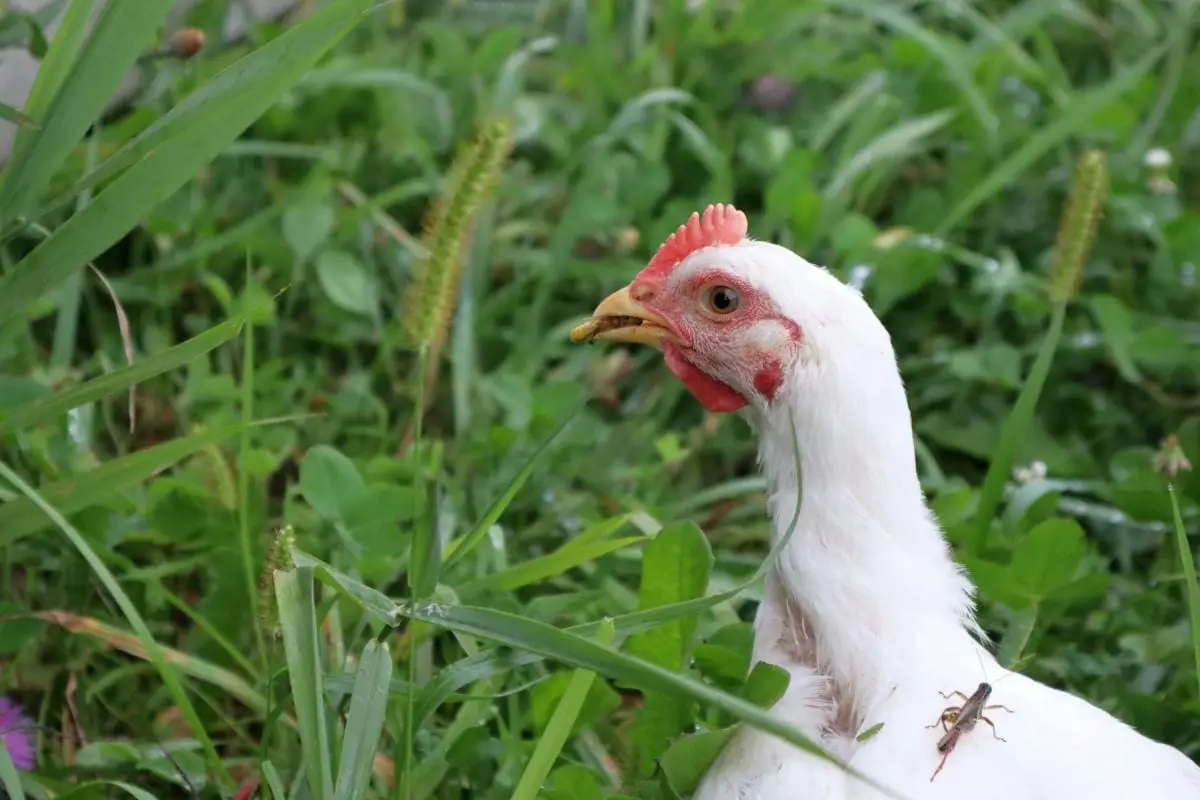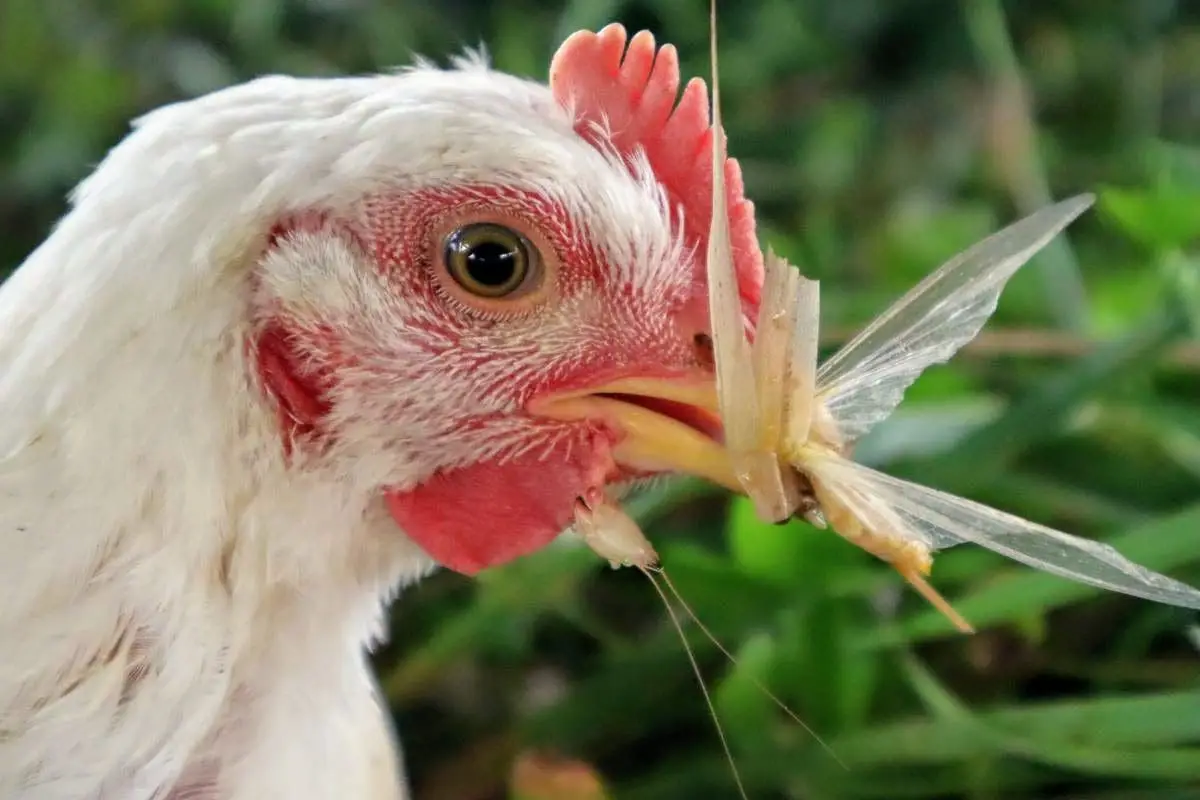Looking through the supermarket selection of chicken cuts and eggs, you’ve likely noticed the claim on the packaging “100% Vegetarian Diet” or something similar. A question came to me, “What’s the deal with vegetarian fed chickens and should I care?” Great question. Let’s look further.
I won’t hold you in indefinite narrative suspense. Chickens are not naturally vegetarians. Nor are turkeys, ducks, or most other domesticated birds. Chickens are opportunistic omnivores.
Wild Chicken Diets
In looking at domesticated animals, whether dogs, cats, cows, or chickens, I prefer to study their dietary needs with the perspective of looking back at their pre-domesticated ancestors. Certainly, anyone comparing a beagle to its wolf ancestor or a modern chicken to its Asian Jungle fowl ancestor will notice obvious changes. But these animals have far more genetic code pre-dating their interaction with humans than that which changed during the course of their domestication.
So what did the pre-domesticated chickens eat? This is an easy one to answer, because their ancestors are still among us as Red and Green Jungle Fowl, native to South Asia. Their diet consists of a wide variety of materials, including fruits, seeds, leafy materials, arthropods (insects, termites, etc.), worms, leeches, snails, crustaceans, small mammals, and snakes (source info here). Quite an omnivorous diet, isn’t it?
For the vegetarian portion of their diet, we give our chickens access to fresh pasture. There they forage for plant materials, allowing them to meet their natural instinct to eat plants. And unlike our grass fed beef cattle, we are OK with giving chickens grain as well. Their natural role in the ecosystem is to be seed eaters. Our only stipulation for the grain is that it must be Certified Organic. We don’t want to expose the chickens to residual pesticides or herbicides in thir grain.
But the study of wild chicken diets tells us more. They eat meat. They need the proteins and fats in meat to be healthy. Chickens have sharp, strong beaks perfectly adapted to eating small critters. Spend a moment staring into that beady eye, and you’ll know you’re looking back at a thinly veiled dinosaur.

Pasture Raised Chickens Are Hunters
This week I brought the camera out each evening when we moved the chicken shelters. This stirs up the bugs in the pasture and I wanted to get some pictures of our chickens as predators. It turns out getting photos is challenging because the chickens are lightning fast when they strike. For every good photo I threw out at least a hundred blurry ones.
This is peak grasshopper and cricket season. Every step in the pasture creates an eruption of dozens of them, so the chickens are enjoying an uninterrupted feast.

In the past I’ve seen our hens catch mice and snakes, but I’ve never had a camera handy for those events. You’ll need to take my word for it. No vegetarian fed chickens here.
By the way, I should mention that we always keep a few chickens loose near our house. Besides all the big bugs we’ve described already, chickens eat ticks. We’re glad to have chickens around to keep the tick population under control!
“Vegetarian Fed Chicken” Was Never About the Chickens
Here’s where things get crazy: the push for vegetarian fed chicken was never about the health of chickens. It was about grain fed, feedlot beef. The story is a little circuitous, so follow closely.
Historically, farmers and homesteaders would feed their chickens a mixture of grain and slaughterhouse scraps. If you look at any old (especially pre-World War II) farming text, you’ll find references to “tankage” in the diet. Tankage included all the little bits of leftover trimmings and rendering scraps from muscle, tendons, fat, skin, and bone dust from butchering beef and pork. Further back, before butchering was a centralized activity, it was customary to give the skeletons of butchered farm animals or wild game to the chickens to peck clean. They didn’t know about amino acids in those days, but that was the key contribution from the meat.
This is the weird part. In more recent history when beef farming began to be concentrated in feed lots, people discovered that they could supplement the relatively low protein in corn with the chicken manure from confined chicken houses. The nitrogen in the manure would give the cattle a protein boost. But then came Bovine Spongiform Encephalopathy, a.k.a. Mad Cow Disease, a disease thought to be transmitted when cattle ingest infected brain or spinal material from infected cattle. The concern was that there was a chance that some minute amount of BSE-infected material in the chicken feed might persist in the poultry barn litter and then get passed on to the cows in the feedlot when they were fed manure.
This is a cautionary tale for sure. Why would anyone think that feeding cattle chicken manure was a good idea, even if it the manure offered protein? As you’d expect, on our farm we stay far from these practices. Our cattle only eat grass, no corn and certainly no chicken manure.
But the push for vegetarian chickens hasn’t been all that great for chickens. In my opinion, feeding them meat scraps was a good use of resources. It would allow a better cycling of unused calories in a form the chickens enjoyed. We would have been better served by focusing more on grass feeding cattle and avoiding the corn and manure diets. What has resulted is that most chicken diets come up short on natural sources of methionine, a critical amino acid plentiful in meat. The usual way most chicken growers deal with this is by supplementing the chickens with synthetic methionine. Thus we’ve arrived at an overly technical solution that depends on a very small number of global suppliers to provide farms with a critical ingredient that is naturally abundant in our existing butchering waste stream.
What To Do?
Our farm operates under the National Organic Protocols. We are inspected and certified to ensure we’re living up to those standards. One of the requirements in those rules (7 CFR § 205.237) states that we must not “feed mammalian or poultry slaughter by-products to mammals or poultry.” I agree that it is a good idea to avoid feeding poultry or mixed by-products to chickens. But I wish the organic standards were implemented differently to allow for feeding organic beef scraps to chickens. I’m not going to be the one to change the rules though.
Fortunately, insects aren’t excluded, so we’ll continue to raise our chickens on insect-rich pastures. We’ll stick to our principles to ensure that our pasture raised chickens are able to live up to their inner chicken-ness by foraging and hunting. And we’ll never, never make our cattle eat corn and chicken manure.


9 thoughts on “Why We Don’t Raise “Vegetarian Fed” Chickens”
Awesome article! I highly agree that chickens are omnivores, and the vegetarian marketing gimmick is despicable. Pastured birds taste better, I heard they behave better too but I’m not sure. If I ever get chickens for myself, I’d definitely give them meat scraps instead of trashing it.
PS The first link points to a gaming site now but I found the pdf from the original link (now under thesiamsociety.org)
Thanks for letting me know that the link to the chicken history article had changed. I’ve updated it with the correct link. Dave
When I first saw “Vegetarian fed Chickens” My first thought was who cares who feeds the chickens.
You are right. The natural understanding of the phrase would lead one to think that the vegetarians being referred to are the farmers feeding the chickens.
Thank you so much for this clarification! I was wondering what was healthy for the chicken as I noticed that the eggs that are “vegetarian fed hens” are smaller than the “free range” and local eggs.
I will now stick to the free range and local eggs rather than the corporate branded “vegetarian” eggs.
I don’t think the size would have anything to do with vegetarian feed. Egg size is primarily a function of age. Hens will typically start with small and then medium eggs that aren’t usually sold in stores (they generally go into commercial food processing or into liquid egg products), then the size slowly creeps up over time from large to extra large to jumbo. Farms can play a bit with feed composition to try to keep eggs in the large and extra large sizes, but they can do that with both vegetarian and non-vegetarian diets.
I love this great article on a proper chicken diet. While I’ve been into organic foods for many years, I only recently learned about the health benefits of grass fed beef / lamb, and free range poultry. Thanks for helping to bring a growing awareness of what constitutes truly natural and healthy animal foods!
You’re welcome Kris.
Excellent Dave!